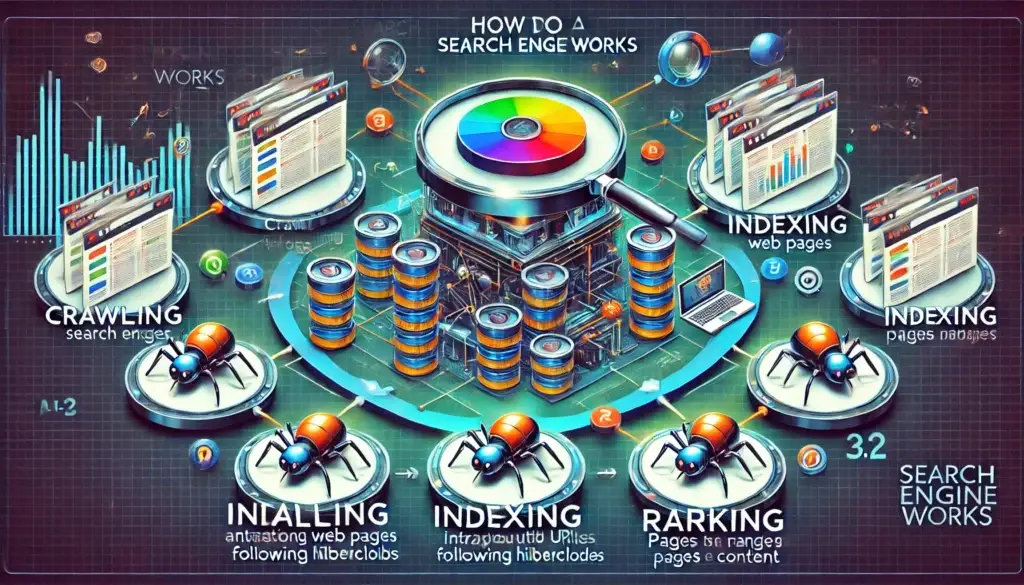
The internet is huge, with millions of websites and pages. Search engines help us find what we need quickly. In this guide, we’ll explain how search engines work in simple terms. We’ll cover crawling, indexing, ranking, and key concepts like search engine bots, PageRank, and more.
Table of Contents
ToggleWhat Are Search Engines?
Search engines are tools that let you search for information on the internet. Popular ones include Google, Bing, and Yahoo. When you type a query, search engines show a list of results that they think are most relevant. But how do they decide which pages to show? Let’s break it down into three main steps: crawling, indexing, and ranking.
Step 1: Crawling
Crawling is how search engines find pages on the web. They use special programs called search engine bots or spiders to browse the internet. These bots visit websites, read their content, and follow links to discover new pages.
Important Points About Crawling:
- Web Crawlers: These bots act like explorers, looking for new or updated pages.
- Crawl Budget: This is the number of pages a bot will visit on a website. Websites with better content and structure often get more attention from bots.
- Robots.txt File: Website owners can use this file to tell bots which pages they can or cannot crawl.
If a bot can’t access a page due to restrictions in the robots.txt file or errors like “404 Not Found,” the page won’t move to the next step.
Step 2: Indexing
Once a page is crawled, the search engine stores its information in a big database called the search engine index. This index is like a library catalog that helps search engines find the right pages when someone searches for something.
What Search Engines Look At During Indexing:
- Keywords: They check the words on the page to understand its topic.
- Content Freshness: Pages that are updated regularly might rank higher.
- Schema Markup: Special tags on a page help search engines understand its content better, such as whether it’s an article, recipe, or product.
- User Engagement: If people spend more time on a page or click on it often, it may be considered more valuable.
However, some pages don’t get indexed. Pages with low-quality content, thin content, or duplicate content are often skipped. Pages can also use a no-index tag to tell search engines not to include them in the index.
Step 3: Ranking
After crawling and indexing, search engines rank pages. This means they decide the order in which results appear when you search for something. This is done using a search engine algorithm — a set of rules and calculations.
How Search Engines Rank Pages:
- Understanding the Search Query: The algorithm analyzes what the user is looking for.
- Relevance: Pages that match the query’s intent are given priority.
- PageRank: This measures how many other websites link to a page and the quality of those links.
- User Experience: Pages that are easy to navigate, fast-loading, and mobile-friendly often rank higher.
Other factors that affect rankings include:
- Location-Dependent Queries: For searches like “cafes near me,” the user’s location is considered.
- Language Detection: Results are shown in the user’s preferred language.
- Search History: Results may vary based on what the user has searched for before.
- Device-Specific Results: Rankings can change depending on whether the user is on a computer or phone.
What Happens When You Search for Something?
When you type a query into a search engine, here’s what happens:
- Matching the Query: The search engine looks through its index to find pages related to the keywords in your query.
- Ranking the Results: The algorithm decides which pages are most relevant and organizes them in order.
- Displaying Results: A list of links appears, often with snippets of text, images, or other features to help you decide what to click on.
Your interactions with the results (what you click and how long you stay on a page) help search engines improve future rankings.
Why Some Pages Don’t Get Indexed
Not all pages make it into the index. Here are common reasons:
- Robots.txt File Exclusions: If the file blocks a page, bots can’t crawl it.
- Noindex Tag: Pages with this tag are skipped intentionally.
- Canonical Tag: This tag tells search engines to treat similar pages as one.
- Low-Quality Content: Pages with little value or duplicate text are often ignored.
- Error Pages: URLs returning errors like “404 Not Found” won’t be indexed.
How to Ensure Your Pages Get Indexed and Ranked
To improve your chances of being indexed and ranked, focus on these areas:
- Create High-Quality Content: Write unique, engaging, and useful content.
- Use Relevant Keywords: Include words and phrases that people are likely to search for.
- Optimize Meta Tags: Titles, descriptions, and headers should be clear and keyword-rich.
- Fix Technical Issues: Ensure your site doesn’t have errors, broken links, or slow load times.
- Enhance User Experience: Make your site easy to navigate and mobile-friendly.
The Importance of High-Quality Content
Content is king when it comes to search engines. Pages that answer questions, solve problems, or provide valuable information are more likely to rank well. Avoid thin or duplicate content, and always aim to provide something unique.
Using tools like Schema markup can also help search engines understand your content better, improving your visibility in search results.
Conclusion
Search engines are incredible tools that simplify our lives by organizing the web. Their processes of crawling, indexing, and ranking ensure users find the most relevant and high-quality results quickly.
By understanding how search engines work, you can optimize your website to align with their requirements. Whether it’s focusing on keywords, improving user experience, or fixing technical issues, every step you take brings you closer to better visibility online. Start implementing these strategies today, and watch your online presence grow.